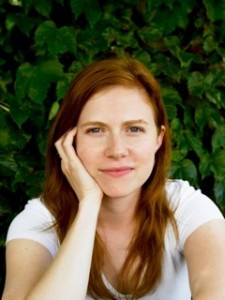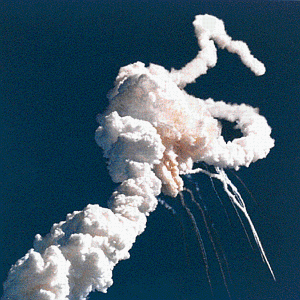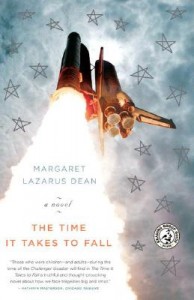
Margaret Lazarus Dean / photo credit Joe Vaughn
When I was asked whether I’d be interested in taking part in a panel on turning the MFA thesis into a first book, I said yes right away, but I wasn’t sure what I could contribute. In fact, I felt like a bit of a fraud because my journey from the thesis to the published book was so long and roundabout. But I’ve convinced myself that this is part of what makes my story worth telling here, because long and roundabout might be just as common as quick and straightforward, and my particular kind of roundabout experience makes me feel emboldened to give certain bits of advice.
I started the MFA program at Michigan writing short stories, as just about everyone does, but I always had trouble with the form. The first story I workshopped upon starting the program was about a little girl in Florida who sees the space shuttle Challenger explode in the sky over her school. It had some passages in it that I was proud of, but as a story it was an unwieldy, wandering thing with no real development and no plot to speak of. I was so clueless I didn’t even realize that these were serious deficiencies, and when one of my classmates told me that I was a good writer “at the sentence level,” I was naïve enough to think he was complimenting me. My Challenger story grew to 30 pages, then 50, then 80, until I finally realized that I was not writing the world’s longest short story, but had in fact embarked on a novel.

Challenger Explosion January 28, 1986
This is always a scary thing to admit to oneself, especially in the middle of an MFA program, many of which (including Michigan, at least at the time) can seem very story-centric. I met with two of my professors to ask long series of confusing craft questions, but in reality what I was asking them was whether it was okay that I was writing a novel, whether I would sound like an idiot if I said in public that I was. My professors were generous enough to encourage me to work on the novel, and pointed out to me that novels are easier to sell than short story collections, a fact that had not previously been brought to my attention.
In my last semester in the program, our class took part in a thesis workshop with Charles Baxter, in which each of our thesis projects was to be examined as a whole. At that point I had been working seriously on the novel for a year, and would like to be able to tell you that I was getting my feet under me, but I distinctly remember Charles Baxter explaining to me in one of our meetings in his office that it was not a good idea to spend fifty pages creating a main character and then end the second chapter with the words, “And I never saw him again.” A short story writer’s mistake, obviously—I had to learn that in the novel you don’t have to pack up all your toys and put them away at the end of each chapter.
I submitted as my MFA thesis the first 150 pages of a novel about a little girl who watches the space shuttle Challenger explosion, knowing that her father’s job at NASA and her own hopes of becoming an astronaut may have been lost along with the spacecraft and its crew. It felt like a bit of a cheat, to be honest— my classmates who submitted collections of stories, like Valerie Laken, had to actually finish each of those stories in every sense—even if there weren’t yet enough stories to make up a published collection, the writer at least had to demonstrate her ability to write complete stories, beginning middle and end. Submitting the first half of my novel (or, as it turned out, first third) felt like cheating because I not only had no idea how the book might end, I also had no idea how to structure a novel or in fact what the very next page would be. I had struggled through those 150 pages a sentence at a time, and I felt like a fraud presenting what I had come up with as “a novel,” when in fact I still felt like I had no idea how to write such a thing.
 I was lucky enough to get a lectureship at Michigan after I graduated from the MFA program. In the evenings, on the weekends, and especially in the summertime, I picked up my copy of my “finished” thesis and shut myself away in my study and ordered myself to finish the book. This was time I spent largely reading over the pages I had already written and feeling alternately hopeful of the work’s potential and self-loathing at the fact that the whole thing hadn’t written itself already. I could see it so clearly when I closed my eyes: the child’s horror at the disaster standing in for an entire generation’s, the resonance when the child’s family breaks apart in slow motion just as the space shuttle breaks apart in the sky— but I kept sort of not seeing that on the pages I’d written. But then sometimes I did—sometimes the passages I’d written years before seemed great to me, or I could see glimpses of the greatness I imagined, and I spent months and years (and I am not exaggerating) rewriting the same paragraphs and pages over and over again when really what I probably needed to be doing was forging ahead, drafting the middle and end, thinking about structure and roadmaps. As I am doing with the novel I’m working on now.
I was lucky enough to get a lectureship at Michigan after I graduated from the MFA program. In the evenings, on the weekends, and especially in the summertime, I picked up my copy of my “finished” thesis and shut myself away in my study and ordered myself to finish the book. This was time I spent largely reading over the pages I had already written and feeling alternately hopeful of the work’s potential and self-loathing at the fact that the whole thing hadn’t written itself already. I could see it so clearly when I closed my eyes: the child’s horror at the disaster standing in for an entire generation’s, the resonance when the child’s family breaks apart in slow motion just as the space shuttle breaks apart in the sky— but I kept sort of not seeing that on the pages I’d written. But then sometimes I did—sometimes the passages I’d written years before seemed great to me, or I could see glimpses of the greatness I imagined, and I spent months and years (and I am not exaggerating) rewriting the same paragraphs and pages over and over again when really what I probably needed to be doing was forging ahead, drafting the middle and end, thinking about structure and roadmaps. As I am doing with the novel I’m working on now.
A year after I finished the program, I was still teaching and still rewriting the same pages over and over again. A few people who had graduated around the same time I did suddenly got agents, and those agents made book deals for those writers based on partial manuscripts, causing panic attacks among the rest of us. I was suddenly stricken with anxiety that this was what I was supposed to have been doing: finishing a partial manuscript that I could entice an agent to be interested in. I decided that that was what I needed to do, but before I got to work seriously on cleaning up the first hundred pages, I made plans to meet with one of my professors from the program, Eileen Pollack, and this was one of the smartest things I’ve ever done.
Eileen suggested we go for a walk rather than sitting down for coffee, and I still remember strolling through the spring buds of Burns Park while Eileen explained to me, very patiently, that I needed to write my book and not worry about what other people were doing. She told me that selling a partial manuscript was a nice option to have, that it had been the right choice for some of my classmates, but it was probably not going to be the right choice for me. Then she promised me— and this impresses me even more now than it did then— she promised me that I would find an agent and find a home for my book if I would just write it first and promise not to think about publication or money or any of the business side of it, and she was absolutely right. I did just need to write it, and to do that took another four years after that conversation.
 Then, and only then, I sent the manuscript to six agents, three of whom offered to work with me. I signed with the amazing and beautiful Julie Barer in 2005, and, after we went through a round of edits together, she sold The Time It Takes to Fall to Simon and Schuster, who brought it out in February 2007, then in paperback in 2008.
Then, and only then, I sent the manuscript to six agents, three of whom offered to work with me. I signed with the amazing and beautiful Julie Barer in 2005, and, after we went through a round of edits together, she sold The Time It Takes to Fall to Simon and Schuster, who brought it out in February 2007, then in paperback in 2008.
I’m making all of that sound really quick and easy, and while I don’t want to mislead you, it really was quick and easy compared to the long hard slog of actually writing the book. But when it was done to my satisfaction I wasn’t afraid anymore of what the agents and editors of the world might say or not say, because I had finished my book and I was proud of it. This is a feeling that I highly recommend, as it also guards against fear of reviews and disappointing sales. It’s not that those things can’t hurt my career—they can—and it doesn’t put me above worrying what others think of my work, which I do, obsessively. But ultimately I can always sleep at night no matter what happens because what I wanted all along was to be a writer when I grew up, and I know I’ve become a writer because I wrote exactly the book I wanted to write.
Now I’m working on my second novel, and because I have a much clearer understanding of structure and how the moving parts of a book fit together, it’s going much more smoothly than my first novel did. Sometimes I wish I could e-mail notes to myself in 2002, telling myself how to take the long view of the narrative, how to roadmap the long arc of the story without getting bogged down in paragraphs and sentences. Then again, maybe I wouldn’t do that even if I could: As much as I make fun of my poky process over the years I wrote my first novel, I find that the process I used is inextricable from the finished book itself. When I flip through my book now looking for a passage to read at a book event, I remember how each scene, each paragraph came out. The things I’m most proud of in the book are the things that took the longest to bake, and so I can’t truthfully say I wish I’d written it more efficiently. If I’d written it efficiently, it wouldn’t be this book.
My students at the University of Tennessee sometimes ask how long it took me to write my book, and I see their faces sink a little when I tell them the truth. It’s important to me to be honest about how long it can really take, and I’m also honest about the fact that it was hard, that there were several points when I felt very strongly that I’d written myself into a corner that I wouldn’t be able to get out of, when I was convinced that I would have to quit and start over. I tell them something I heard Charles Baxter say once in a lecture, that “literature is not a sack race.” I say this to students probably once a week. My husband and I say it to each other around the house. When we write, what we are aiming for is not just to be done, and not just to be published, but to be read and remembered long after we are dead. It takes courage and perseverance to write, and it takes even more courage and perseverance not to be in a rush.
And—I give exactly the same advice to my present graduate students that Eileen gave to me. Write your book, make sure it’s the book you wanted to write when you first said, “I think I want to be a writer when I grow up,” and then—and only then—go out into the world with it.

Extras
– Margaret Dean adapted this essay from her talk for the 2010 AWP panel From MFA Thesis to First Novel—Five Writers Share Their Stories. (Sheila O’Connor, Geoff Herbach, Nami Mun, Valerie Laken, Patti Frazee, Margaret Lazarus Dean)
Is the MFA thesis an end or a beginning? How do we know if our thesis project is a viable book or an early draft that still requires radical revision? For books that need revision, how do writers practice the necessary discipline novels require over the long haul? How do emerging writers secure agents and publishers for that first book? Focusing on the challenges and triumphs of seeing theses projects into print, five first- time novelists will share their diverse writing and publishing experiences. — Description from the AWP Program
– Read an interview with Margaret Lazarus Dean here on Fiction Writers Review, and follow her on The Time It Takes to Blog.
– Read reviews of The Time It Takes to Fall, via the author’s website. Click here to buy the paperback from Powell’s.
– Five British writers talk to the Observer‘s Kate Kellaway about writing their first novels–and getting them published.
– Listen to Grammar Girl’s podcast about Scott Sigler’s “surprisingly simple and slightly disturbing” advice for writing a first novel: in addition to writing every day, he advises penning a “bad book” first, as a way to learn what not to do. And read Robert Twiggler’s “Nine Mistakes to Avoid When Writing Your First Novel” on The First Post.





